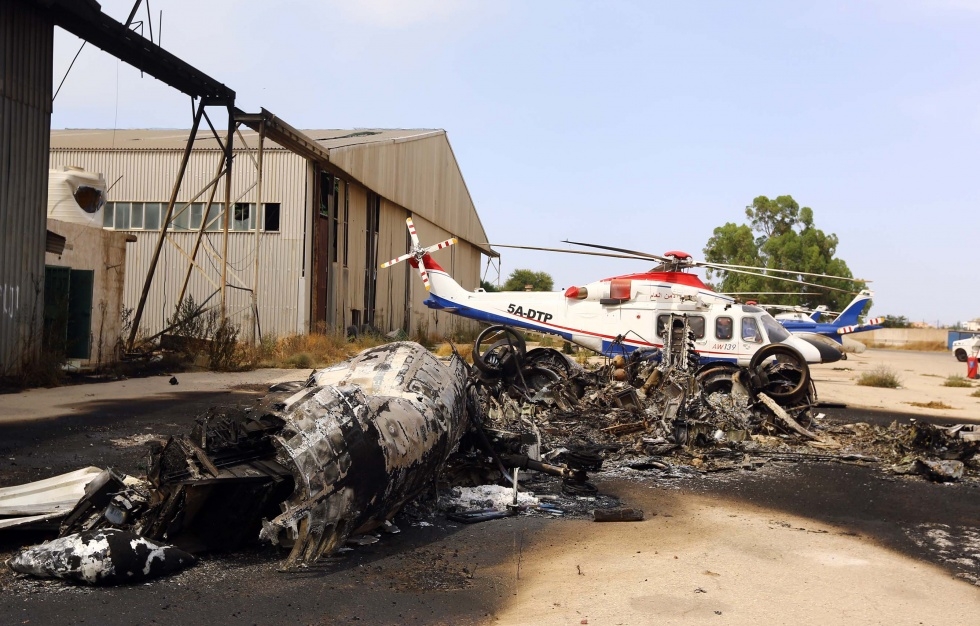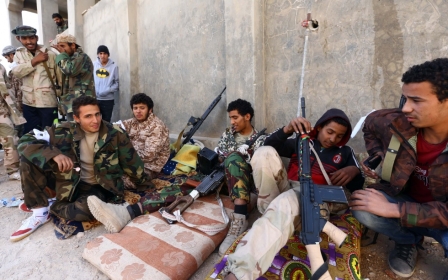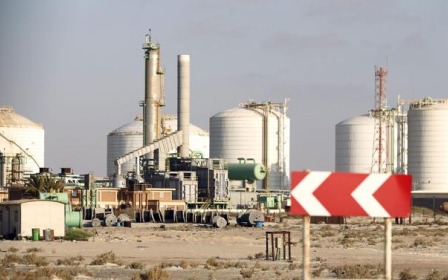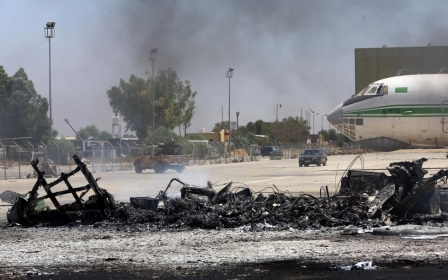ANALYSIS: Tripoli's airport raid could change the balance in Libya's war

Air strikes on Monday that hit Tripoli’s Mitiga airport have escalated Libya’s civil war in the blink of an eye.
Two government air force jets struck Mitiga, which is both an airport and an airbase, held by the rival national salvation government, without warning in the late afternoon.
One bomb landed on rough ground near the runway, while the second slammed into a house over the perimeter, reportedly wounding a woman.
The attack came moments after a civilian plane landed at the airport, causing panic among passengers and staff. That same fear has since spread to many areas of the capital, amid rumours and predictions that the government is now planning to expand its air campaign, which had thus far been largely confined to eastern Libya.
The attack came days after the prime minister of the internationally recognized government in the east, Abdullah al-Thinni, vowed to recapture the capital from salvation government forces, which are named Libya Dawn and have held Tripoli since August. Today’s demonstration of air power, however, could change the military equation.
Until now, Libya’s civil war has had two distinct fronts. In the east, Libya’s small army and pro-government militias have been battling militias like Ansar al-Sharia, for the past six months. Strikes by air force jets and helicopters have proved the decisive element in seeing these forces pushed back and confined into small scattered pockets around the city.
But the war in Libya’s the west had been an almost separate affair. Libya Dawn, a coalition of militias headed by Misratan forces and other tribal forces, with the backing the Tripoli-based salvation government, captured Tripoli from rival House of Representatives forces in August.
Since then, they have pushed the front outwards, south and west. Battles have raged across the region, with heavy fighting in recent weeks for the strategically important town of Kikla, south of the capital.
Until now, neither side in the western war had the use of air power. That has now seemingly changed and the Mitiga air strikes are a vivid harbinger of what is likely to come.
Without air power, the protagonists in western Libya are evenly matched; both rely on semi-trained militias armed with artillery weapons, but few tanks or armoured vehicles. Neither side has the combat power on the ground to inflict a decisive blow on the other. Air power may change that balance.
The most immediate effect of Monday’s strikes is economic. Since Libya Dawn forces captured Tripoli, most international flights have been suspended, and the western areas forced to rely on a handful of flights connecting Tripoli and Misrata with foreign destinations, including Turkey and Malta.
Within hours of the strikes, Mitiga declared it had re-opened, but it is unclear if civilian flights will continue to use an airport that is now subject to no-notice air strikes. If similar strikes follow in Misrata, it will leave the salvation government without an air link, even as flights continue in government-held areas in eastern Libya at Tobruk and al-Bayda.
For United Nations envoy Bernadino Leon, the bombing could hardly have come at a worse time. He is due to embark this week on another round of talks with both Tripoli and Tobruk governments, seeking enough common ground to fix a ceasefire. Even before the air strikes, the chances for peace looked bleak.
Leon’s mission is complicated because the United Nations recognises the Tobruk parliament as legitimate but does not recognise its rival in Tripoli, which is largely made up largely of reconstituted members from the old General National Congree.
Accommodating this meant Leon at first limited his mediation to meetings between members of the Tobruk parliament who attended it sessions, and those who boycotted it, choosing to side with the Tripoli-based government.
This so-called Ghadames Process - named after the western town where the first meeting was held - was aimed at persuading boycotting members, including Misratans and so-called Islamists factions - to return to parliament, in exchange for guarantees that parliament would remain inclusive enough to accommodate them.
In October, Leon persuaded UN Secretary General Ban Ki Moon to attend a Ghadarmes Process session in Tripoli, hoping his support would push both sides to agree a ceasefire. Instead, the war continued.
Then came what some diplomats thought might be a window of opportunity when Libya’s Supreme Court ruled earlier in November that elections in June for the House of Representatives, now in Tobruk, were illegal. The judgement said that the former parliament, the GNC, had passed an illegal law setting up the June elections, making the House of Representatives in effect illegal.
With the former congress by now dissolved, and the ruling seeming to invalidate the new parliament, diplomats hoped Leon would gain the chance to persuade all sides it was time to create a unity government.
In an interview with Spanish newspaper El Pais, Leon sounded out the possibility of persuading both rival governments to allow the key institutions of Libya, the central bank, Libyan Investment Authority and National Oil Corporation to become “independent” - making decisions for all Libyans.
He then met with the former speaker of the defunct congress, Nuri Abu Sahmain in Tripoli, to ask for his observations on what the national salvation government would want as the price for peace.
But since that meeting, Libya’s fighting has taken a turn for the worse. In the east, air strikes hit Islamist units in Derna and army and air force units pushed deep into Benghazi, claiming to now hold 80 percent of the city. In the west, Libya Dawn units occupied the largest oil field, Sharara, in the south west, while further north Zintan forces captured the key strategic town of Kikla after bitter fighting with Dawn units.
Then last week the United Nations Security Council designated Ansar al-Sharia, the most prominent militia in Benghazi branded as a “terrorist” organisation by the US which accuses it of links with al-Qaida. The designation was a further complication for Leon, making it politically difficult to negotiate with its leaders.
Days later, Libya’s army announced it was widening its air war, with strikes that had been limited to eastern Libyan spreading to the west.
Monday’s strikes showed that the government is serious, having apparently written-off hopes of ending the war through negotiation. Army gains in Benghazi, and the success in capturing Kikla, which was announced on Monday, may have convinced senior army figures that government forces, backed by air power, can prevail.
The Tripoli leadership has been equally robust, with Tripoli-based prime minister Omar al-Hasi insisting that he represents the true face of the 2011 revolution that toppled former leader Muammar Gaddafi. Monday saw protestors gather outside the UN office in Tripoli, demanding that Leon be refused entry to the capital and accusing him of siding with the Tobruk government.
Leon is due to visit both rival governments in the coming days, once again seeking agreement for a ceasefire and a unity government. Among ideas being floated is that the constitutional assembly, elected in February to draw up, as its name suggests, the country’s constitution, would take responsibility for a unity government that can manage the country, and keep it at peace, until the constitution itself is ready.
But it may be a hard sell. The Tripoli bombing has further inflamed the Hasi government, which accuses its rival in the east of being dominated by a former general, Khalifa Hiftar, who it brands as a terrorist. The Tobruk parliament meanwhile has already passed a decree labelling Libya Dawn forces as “terrorists.” Both sides show little inclination to talk peace after so much war, and persuading them to change tack will be all the harder after Monday’s air strikes.
Stay informed with MEE's newsletters
Sign up to get the latest alerts, insights and analysis, starting with Turkey Unpacked
Middle East Eye delivers independent and unrivalled coverage and analysis of the Middle East, North Africa and beyond. To learn more about republishing this content and the associated fees, please fill out this form. More about MEE can be found here.




